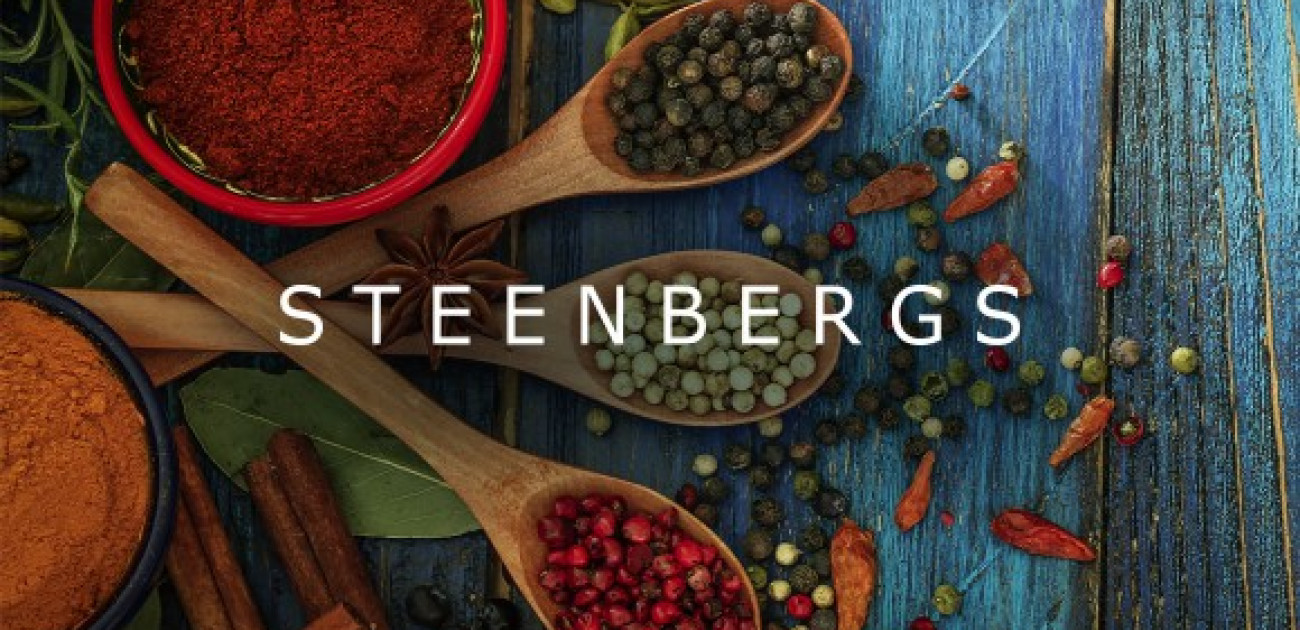24 March 2009
What is Steenbergs?

We have finally decided to start a blog after running our business - Steenbergs - and our website since early 2004.
I thought we should start the blog by trying to explain how we started and what Steenbergs is about.
I (that's Axel Steenberg) used to work in the City (mostly Leeds, rather than London). Later, I became Finance Director for a Sport Media busines and very briefly for a Minerals Exploration business (although we never found much). However, I was never comfortable with the lifestyle and the work, even if the pay was fairly good. So after the Sports Media business was taken over and I parted company with them, I started thinking about what we could do.
The answer was for my wife (Sophie Steenberg) and I to set up our own business in herbs and spices, as we felt that the quality in the shops was not great. We took the keys for the factory - 5 days after our daughter's first birthday, our eldest child being then all of 2 years old. Sophie had previously worked for business-to-business PR and internal communications and lastly - and more rewarding - she had been working on a fundraising appeal for Macmillan Cancer Relief in Harrogate.
We never really thought about the ethics of the business in great detail - it just was natural for us that Steenbergs would have to be organic and we would be as ethical in everything we do as was practical. This is our family philosophy as well as our business philosophy.
So in a nutshell that's what Steenbergs is about - great herbs & spices that are organic and ethically sourced!
Getting the suppliers has been the most challenging part of setting up. We had to do everything from scratch and no-one gave us any guidance or help. Except to ask us whether we wanted conventional spices, or told us that of course their spices/herbs were organic (even though they had no certification for this) - always the end of the conversation. Everyone thought we were mad - but we think we've proved that you can get organic spices, ethically sourced, packed with flavour and keep the variety of spices and blends.
Also, there was no concept of Fairtrade spices at the time. We managed to get Fairtrade certification for some of the teas that we were importing direct from producers. We then put a proposal to Fairtrade that included detailed spreadsheets on the costs of growing pepper, including lots of wonderfully useful facts and figures on farmgate prices and yields from conventional and organic farming of pepper. We have never quite understood what happened to this document after we sent it to Fairtrade, but it obviously landed at some point on the right desk. Some time later, we did become part of the first group of spice merchants to become Fairtrade for spices (the other 2 were Italian businesses), followed by our import of the first Fairtrade spices to the UK and the subsequent launch of the first Fairtrade spices for retailersto the UK, Irish and Finnish markets.
We still are trying to innovate in this area and continue to pioneer in this area. We were the first to start producing Fairtrade vanilla extract after The Fairtrade Foundation asked us whether it would be possible to do this for a well known chocolate bar.
Getting the back-room stuff right still remains the hardest. What is the most environmental form of packaging for spices - we still think it is glass. We do not have machines that pack thousands every few seconds, or fancy labelling machines - most of our products are blended in small batches by hand, packed by hand and labelled by hand. Glass is the only off-the-shelf product (other than plastic) that allows you to do this. Plus glass is genuinely recycled, unlike plastics which are rarely recycled in the UK. It's the same for our teas - these are hand-blended and hand packed to order.
Having said that our packers are amazing and fast - so it's not a limiting factor! Most of them have been with us for over 3 years and have helped to develop the systems we work with and are always fantastic when there's a new challenge to be faced.
We still struggle on the best cleaning materials for us and how to package our bulk products - we have to use virgin blue plastic in this area to meet Food Contact Legislation and the "even more stringent" requirements of the food manufacturers who buy our products.
Transport is another real issue and one that is almost impossible to answer - our products are all imported and we need to use transport to distribute our products. But we do not have our own distribution capability and so do not duplicate networks that are already out there. We rarely fly our goods in - they usually come on boats - the only products that are flown in are saffron and vanilla - where the minimum quantity by boat/truck is five tonnes.
So where are we now? We've moved factory once and were delighted to be able to incorporate a number of eco-features in it - as it was a new build - but that's for another day. We are stocked in Booths, Wholefoods, Fenwicks and Oxfams, as well as 3 UK distributors and 2 overseas and independents nationwide. There's still a long way to go - but that again's for another day...




